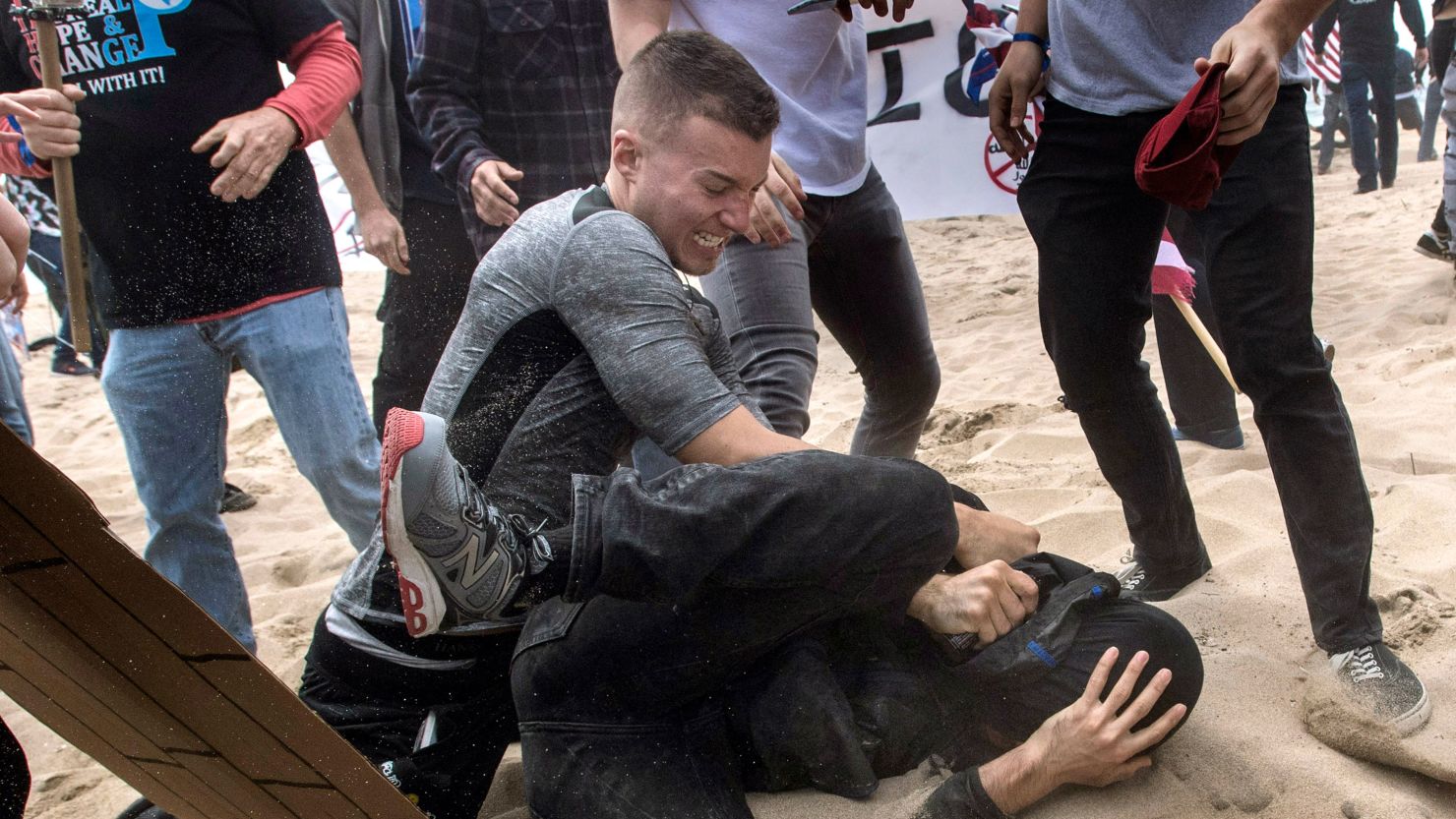After a federal judge made the rare decision to dismiss a criminal case against two White nationalists suspected of inciting violence at political rallies, an appeals court on Thursday put the ruling on hold and one of the men was re-arrested.
The appeals court stay came after the highly unusual ruling of US District Court Judge Cormac Carney to dismiss the case against Robert Rundo and Robert Boman, saying they were being selectively prosecuted while far left groups weren’t. The two men were under indictment for conspiracy, riots, and aiding and abetting.
Rundo, who was released after the ruling, was taken back into custody by federal agents, a law enforcement official involved in the investigation told CNN Thursday.
Rundo was believed to have traveled to the US-Mexico border after his release, a law enforcement source told CNN. The Justice Department obtained a warrant to take him back into custody, saying he was “an extremely serious flight risk.”
Rundo will now remain in custody while the 9th Circuit Court of Appeals considers motions involving his release, according to court records.
Court records show Rundo’s attorneys had signaled their intention to possibly request Carney’s intervention yet again in the matter involving their client, but in the new order the higher court blocked Carney and other judges from any further action while they consider the matter.
“No lower court may order his release absent further order of this Court,” the Ninth Circuit commanded in their order.
Rundo and Boman were allegedly members of the Rise Above Movement, RAM, which Carney described as “a group of far-right, white supremacist nationalists, who attended several rallies and protests during which they engaged in violent acts.”
They were both indicted under the federal Anti-Riot Act – referred to by Carney as “a-once-rarely-used criminal statute.”
The men are believed to have recruited and given combat training to like-minded members, then incited violence at political rallies in Huntington Beach and Berkeley, California, and in Charlottesville, Virginia.
“Beginning around March 2017, (Rundo and Boman) agreed to riot at political rallies and organized demonstrations, where they would assault individuals they believed were associated with Antifa and related far-left groups,” Carney wrote.
The defense presented a motion to dismiss the case, saying the men were the victims of selective prosecution.
“It is not uncommon for a defendant to raise selective prosecution as a defense but it is extraordinarily uncommon for that defense to succeed because the defendant has to prove that other similarity positioned people were not prosecuted,” said CNN senior legal analyst Elie Honig.
But Carney took exception to what he viewed as an imbalance by federal prosecutors in charging White nationalists with crimes under the Anti-Riot Act, but – in his view – not similarly charging far left agitators.
“The government cannot prosecute RAM members such as Defendants while ignoring the violence of members of Antifa and related far-left groups because RAM engaged in what the government and many believe is more offensive speech,” wrote Carney.
“By many accounts, members of Antifa and related far-left groups engaged in worse conduct and in fact instigated much of the violence that broke out at these otherwise constitutionally protected rallies to silence the protected speech of the supporters of President Trump,” Carney wrote, adding he viewed prosecuting far right rioters while ignoring far left instigators as “constitutionally impermissible.”
“Such selective prosecution leaves the troubling impression that the government believes speech on the left more deserving of protection than speech on the right,” wrote Carney.
Following widespread civil unrest in the country in 2020, federal prosecutors did bring more than 200 cases against individuals alleged to have engaged in violence during protests after the police killing of George Floyd. Some cases were for riot-related crimes and others for lesser offenses usually handled by local authorities, not federal prosecutors.
At the time, then-Attorney General William Barr urged federal prosecutors to get tougher in bringing more cases, including exploring using a rarely used sedition law, but some federal prosecutors were taken aback by the notion of charging protestors with violating a law that makes it a crime to conspire to overthrow the government.
Barr frequently lashed out at leftist groups, including publicly decrying Antifa, but despite his threats to go after the group, the Justice Department under his leadership did not bring widespread charges against so-called Antifa members – an amalgamation of individuals holding various views, which, unlike various neo-Nazi and White supremacist groups, has no formal leadership structure or membership.
Attorneys for both Rundo and Boman did not respond to CNN’s multiple requests for comment on the recent court action.
Judge Carney is no stranger to controversial rulings. Late last year, he blocked parts of a California law that would have banned carrying concealed weapons in a multitude of public places. And in 2014, he deemed California’s death penalty unconstitutional, calling the administration of the state’s system “dysfunctional.”
Carney was once the chief judge of the Central District of California, but stepped down after making a racially insensitive remark about a top administrative official at the court, according to the Los Angeles Times.
CNN’s Sara Sidner and Evan Perez contributed to this report.





